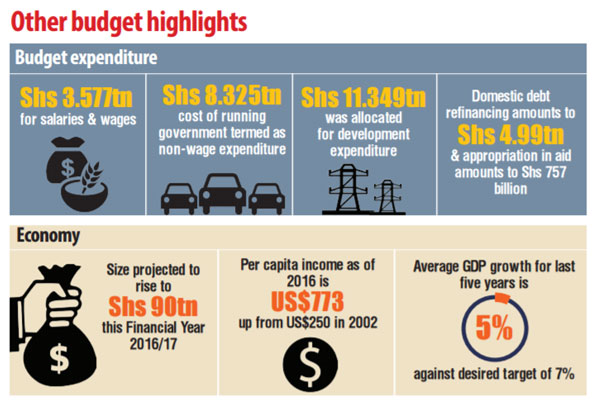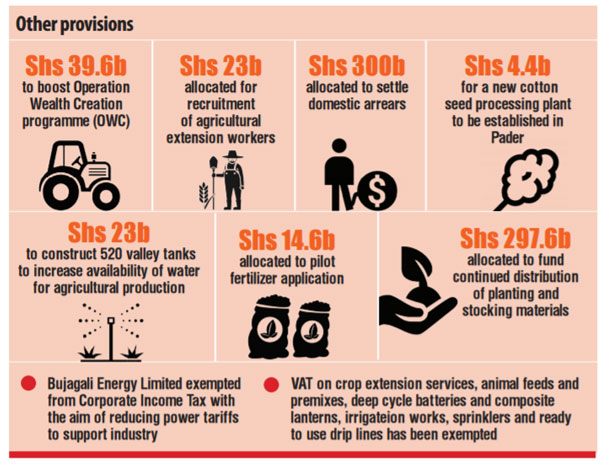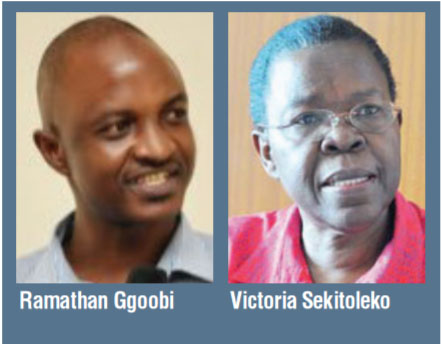

Budgeting for worst years
A lot of attention has been fixed on this year’s budget because it comes on the back of over six years of poor economic performance with the year ending June 2016 being possibly the worst. In the last 12 months, talk of corporate bailout has entered the national lexicon as companies closed, lowered production, or suffered crippling losses
Even before Kasaija read the budget, an informal survey conducted by The Independent among top company executives who are familiar with the Budget Framework Paper and Background to the Budget and had been following the budget making process showed concerns that the budget did not adequately respond to the economic slowdown. In fact, some company executives said they are worried that some measures being pursued by government in the 2017/18 would further damage private business. These are mainly in the beer, betting, cigarette, and commercial business sectors.
At the same time, the IMF and the Word Bank had already projected GDP growth for Uganda to slow down even further to between 3.5% – 4% down from 4.8% projected the previous year. As has been the case in recent years, the mood of pessimism means even the low projection might not be achieved. The government had, for example, projected the economy to grow between 5-6% for FY2016/17. The only hope was for the government to introduce some new thinking into the economy. Kasaija appears to have been keenly aware of this.
“To attain the middle income goal, we have set ourselves, business cannot be as usual; mind-sets and attitudes of all Ugandans must change towards hard work and not wait for handouts. All able-bodied Ugandans must engage in productive economic activities,” he told the budget reading audience which included President Yoweri Museveni, MPs, diplomats and other dignitaries at the Serena International Conference Centre in Kampala on June 08.
He said the government is this time determined to act on corrupt and lazy public servants that derail effective implementation of government programmes.
Kasaija’s small purse
But, despite his pledges, it appears Kasaija was bound to cause a lot of disappointment because, in reality, he has very little room in which to wiggle out of the situation.
Although he read a Shs29 trillion budget; the biggest in Uganda’s history, in reality he has only about Shs11.3 trillion to spend on development in the next financial year.
The rest of the money; Shs3.5 trillion is for salaries and wages, Shs 8.3trillion is the cost of running government termed as non-wage expenditure, Shs4.99 trillion as domestic debt refinancing, and Shs757 billion is appropriation in aid or money collected and spent by departments.
Therefore, the focus should be on what Kasaija does with the Shs11.3 trillion he has to spend on development. Of this, only Shs4.273 trillion will be funded by government resources and Shs7 trillion will be external financing. Of the external financing of the development budget, Shs5.4 trillion will be borrowed and Shs1.5 trillion will be grants. Domestic borrowing will amount to Shs954 billion.
To finance the government expenditure Uganda Revenue Authority (URA), which has suffered a projected Shs377 billion revenue shortfall this year, must now collect Shs15 trillion – meaning more stringent enforcement since, URA is closed to widening revenue collection. Kasaija allocated an additional Shs 90bn to URA to enforce compliance.

2017/2018 budget strategy
In terms of prioritisation, observers said, Kasaija’s budget strategy is in sync with the financing interventions stipulated in the National Development Plan II. These include development of infrastructure, improving agricultural productivity and value addition, and skills development and strategies to stimulate employment. But, commentators say, the allocation of resources in the budget and later its implementation, are debatable.
“In the past years, Uganda’s budget was good on paper but it was never implemented. Now we are saying; Uganda’s budget is even bad on paper and it will not be implemented because we are so obsessed with certain things and yet we would do better if we went for other things,” said Ggoobi during a Post-Budget Breakfast Meeting organised by Uganda Revenue Authority on June 12 in Kampala.
 The Independent Uganda: You get the Truth we Pay the Price
The Independent Uganda: You get the Truth we Pay the Price



You ould certainly see your expertise within the article you write.
The worldd hopes for even more passonate writers like yoou who aren’t afraid too say how they believe.
Always go after your heart.
Incredible points. Outstanding arguments. Keep up the greatt effort.
Wow! In the end I gott a web site from where I be capable of truly take helpful data
regarding my study and knowledge.
I like looking through an article that will make men and
women think. Also, thank you for allowing me too comment!
I’m really enjoging thhe theme/design of your site. Do you ever
run into any internet browser compatibility issues? A few of my blog audience have complained about my website
not working correctly in Explorer but loooks great in Chrome.
Do you have any adviice to help fix this issue?